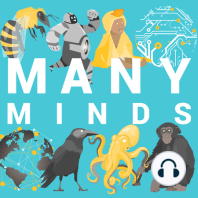13 min listen
Happiness and the predictive mind
FromMany Minds
ratings:
Length:
62 minutes
Released:
Oct 19, 2022
Format:
Podcast episode
Description
There's an old view of the mind that goes something like this: The world is flooding in, and we're sitting back, just trying to process it all. Our minds are basically passive and reactive, always a step behind. Contrast that view with a new one that’s quickly gaining ground. According to this alternative, we don't just react to the world, we anticipate it. We’re not leaning back but trying to stay a step ahead—our minds are fundamentally active and predictive. And our predictions aren't just idle guesses, either—they're shaping how we experience the world. This new view is known as the “predictive processing framework”, and it has implications, not just for how we perceive, but also for how we act and how we feel, for our happiness and our well-being. My guest today is Dr. Mark Miller. Mark is a philosopher of cognition and senior research fellow at the Centre for Consciousness and Contemplative Studies at Monash University. He's part of a new wave of intensely interdisciplinary scholars who are working at the intersections of philosophy, neuroscience, and psychiatry. Here, Mark and I sketch the predictive processing framework and unpack some of its key pillars. We discuss how this approach can inform our understanding of depression, addiction, and PTSD. We sketch out notions of loops and slopes, stickiness and rigidity, wobble and volatility, edges and grip. And, on the way, we will have a bit to say about video games, play, horror, psychedelics, and meditation. This was all pretty new terrain for me, but Mark proved an affable and capable guide. If you enjoy this episode and want to explore some of these topics further, definitely check out the Contemplative Science Podcast, which Mark co-hosts. Alright friends, on to my chat with Mark Miller. Enjoy! A transcript of this episode is available here. Notes and links 4:15 – The website of the Hokkaido University Center for Human Nature, Artificial Intelligence, and Neuroscience (CHAIN). The website of the Monash Centre for Consciousness and Contemplative Studies (M3CS). 6:00 – Dr. Miller co-hosts the Contemplative Science podcast, a project of M3CS. 7:30 – For one introduction to the predictive processing framework, see this article by Dr. Miller and colleagues. 11:00 – See Dr. Miller’s essay in Aeon on social media, co-authored with Ben White, as well as this more detailed treatment for an academic audience. 12:00 – See a paper by Dr. Miller and colleagues on depression. 14:00 – An introduction to the subfield of “computational psychiatry.” 17:00 – Andy Clark’s “watershed” paper on the predictive processing framework. 18:00 – A recent book on “active inference” (which is largely synonymous with the predictive processing approach). 22:00 – A chapter on the idea of the “body as the first prior.” 24:30 – A demo of the “hollow face” illusion. 29:00 – On the potential value of psychedelics in jarring people out of trenches and ruts, see also our earlier episode with Alison Gopnik. 31:00 – See our recent episode with Dimitris Xygalatas. 34:30 – A popular article on children wanting to hear the same stories over and over. 38:00 – A paper by Coltan Scrivner and colleagues on horror fans and psychological resilience during COVD-19. 42:30 – A recent article by Dr. Miller and colleagues about the “predictive dynamics of happiness and well-being,” which covers much of the same terrain as this episode. 46:00 – A recent paper by Dr. Miller and colleagues on the evocative notion of “grip.” 50:00 – A recent paper by Dr. Miller and colleagues about video games and predictive processing. 57:00 – A paper by Dr. Miller and colleagues in which they discuss meditation in the context of the prediction processing approach. Dr. Miller recommends books by the philosopher Andy Clark, including: Surfing Uncertainty You can read more about Dr. Miller’s work on his website and follow him on Twitter. Many Minds is a project of the Diverse Intelligences Summer Institute (DISI) (https
Released:
Oct 19, 2022
Format:
Podcast episode
Titles in the series (100)
The puzzle of piloerection: Welcome back folks! We’ve got an audio essay for you this week. It touches on art, music, the skin, the spine, individual differences, vestigial responses, tiny muscles. There’s even some Darwin thrown in there. It’s a fun one. Hope you enjoy... by Many Minds
